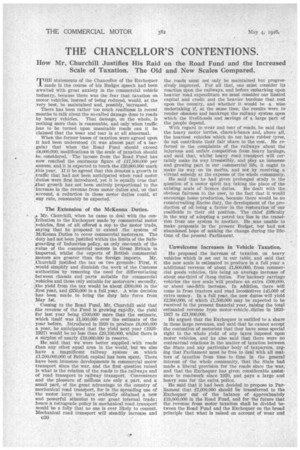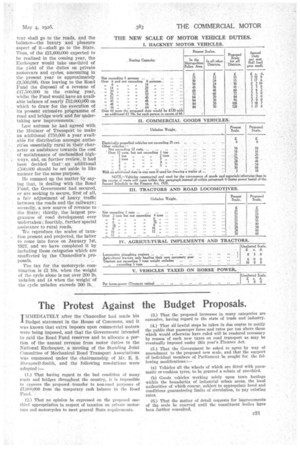THE CHANCELLOR'S CONTENTIONS.
Page 14

Page 15

If you've noticed an error in this article please click here to report it so we can fix it.
How Mr, Churchill Justifies His Raid on the Road Fund and the Increased Scale of Taxation. The Old and New Scales Compared.
THE statements of the Chancellor of the Exchequer made in the course of his Budget speech had been awaited with great anxiety in the commercial vehicle industry, because there was the fear that taxation on motor vehicles, instead of being reduced, would, at the very beat, be maintained and, possibly, increased.
There has been rather too much readiness in recent months to talk about the so-called damage done to roads by heavy vehicles. That damage, on the whole, is nothing more than is reasonable, and only when traffic has to be turned upon unsuitable roads can it be claimed that the wear and tear is at all abnormal.
When the former bases of taxation were agreed upon it had been understood (it was almost part of a bargain) that when the Road Fund should exceed £8,000,000, modifications in the scale of aaxatiofl should be. considered. The income from the Road Fund has now reached the enormous figure of 117,500,000 per annum, and It is expected to touch the £20,000,000 mark this year. If it be agreed that this denotes a 'growth in traffic that had not been anticipated when road motor ,duties were first introduced, yet It is equally true that that growth has not been entirely proportional to the Increase in the revenue from motor duties and, oft that .account, a reduction in these motor duties could, at any rate, reasonably be expected.
The Extension of the McKenna Duties.
• .!.k Mr. Churchill, when he came to deal with the contribution to the Exchequer made by commercial motor vehides, first of all offered a sop to the motor trade, saying that he proposed to extend the system of McKenna Duties to cover commercial motorcars. The 'duty had not been justified within the limits of the Safeguarding of Industries policy, as only one-tenth of the ;value of the commercial motors in Great Britain is Imported, whilst the exports of British commercial ,ThOtOrS are greater than the foreign imports. Mr. ,Churchill justified the tax on two grounds: First, it ;would simplify and diminish the work of the Customs authorities by removing the need for differentiating .between chassis and parts suitable for commercial :rvehicles and those only suitable for motorcars; secondly, the yield from the tax would be about £300,000 in the first year, and £350,000 in a full year. A wise decision 'has been made to bring the duty into force from May 1st.
Coming to the Road Fund, Mr. Churchill said that the revenue of the Fund is growing rapidly, the yield ifor last year being £500,000 more than the estimate, Which itself was £1,000,000 over the estimate of the year before. Introduced in 1920 to produce £8,000,000 a year, he anticipated that the yield next year (19261927) would be no leas than £20,100,000, whilst there is a surplus of nearly £19,000,000 in reserve.
He said that we were better supplied with roads than any other equal area in the world, but we also have a magnificent railway system on which £1,200,000,000 of British capital has been spent. There have been immense developments in commercial motor transport since the war, and the first question raised is what is the relation of the roads to the railways and of road transport to railway transport. Convenience and the pleasure of millions are only a part, and a small part,of the great advantage to the country of mechanical road transport, for in the spreading use of the motor lorry we have evidently oi5tained a new and powerful stimulus to our great internal trade; hence a retrograde policy in mechanical road transport would be a folly that no one is ever likely to commit. Mechanical road transport will steadily increase and c30
the roads must not only be maintained but progressively improved. For all that, one must consider its reaction Upon the railways, and before embarking upon heavier road expenditure we must consider our limited capital and credit and the heavier burdens that rest upon the country, and whether it would be a wise undertaking if, at the same time, the results were to render obsolete and bankrupt the railway system upon which the livelihoods and savings of a large part of the people depend.
With regard to wear and tear of roads, he said that the heavy motor lorries, ehars-h-bancs and, above all, the heaviest vehicles which do not have rubber tyres, do not contribute their fair share to the cost. He referred to the complaints of the railways about the injurious and unfair competition from heavy haulage, and said that, whilst heavy road transport will certainly make its way irresistibly, and play an immense and growing part in our commercial life, it ought to make its way on its merits, and not by receiving a virtual subsidy at the expense of the whole community.
He said that he had given prolonged study to the question of a motor spirit tax taking the place of the existing scale of licence duties. He dealt with the obvious fairness to the user, to the fact that it would encourage home production, because there would be no countervailing Excise duty, the development of the production of oil being a factor in the restoration of our coalfields to their old position. The chief difficulty in the way of adopting a petrol tax lies in the transition from one system to another. He was .unable to make proposals in the present Budget, but had not abandoned hope of making the change during the-lifetime of the present Parliament.
Unwelcome Increases in Vehicle Taxation.
He proposed the increase of taxation on heavy vehicles which is set out in our table, and said that the new scale is estimated to produce in a full year a additional revenue of about £1,800,000, from commercial goods vehicles, this being an average increase of about one-third of these duties. For hackney carriage vehicles the new scale will produce an extra £500,000, or about oae-fifth increase. In addition, there will come in from tractors and road locomotives £45,000 of extra money. In a full year, the new duties will yield 12,300,000, of which £1,500,000 may be expected to be received in the present financial year, raising the total estimated .revenue from motor-vehicle, duties in 19261927 to £21,600,000.
He argued that the Exchequer is entitled to a share in these large revenues, and said that he cannot accept the contention of motorists that they have some special right to the whole yield of any taxes imposed upon motor vehicles, and he also said that there were no contractual relations in the matter of taxation between the State and any particular body of taxpayers, urging that Parliament must be free to deal with all matters of taxation from time to time in the general interest of the whole community, that the State had made a liberal provision for the roads since the war, and that the Exchequer has given considerable assistance to roadwork since 1920, and pays a large and heavy sum for the extra police.
He said that it had been decided to propose to Parliament that £7,000,000 should be transferred to the Exchequer out of the balance of approximately .£19,000,000 in the Road Fund, and for the future that the revenue from motor taxation shall be divided between the Road Fund and the Exchequer on the broad principle that what is raised on account of wear and tear shall go to the roads, and the balance—the luxury and pleasure aspect ox it—shall go to the State. Thus, of the £21,600,000 expected to be realized in the coming year, the Exchequer would take one-third of the yield of the duties on private motorcars and cycles, amounting in the present year to approximately 13,500,000, thus leaving to the Road Fund the disposal of a revenue of £17,500,000 in the coming year, whilst the Fund would have an available balance of nearly D2,000,004 on which to draw for the execution of its present extensive programme of road and bridge work and for undertaking new improvements.
Last autumn he had agreed with the Minister of Transport to make an additional £750,000 a year available for distribution amongst authorities essentially rural in their character as assistance towards the cost of maintenance of unclassified highways, and, on further review, it had been decided that an additional 4:500,000 should be set aside in like manner for the same purpose.
He summed up the matter by saying that, in dealing with the Road Fund, the Government had secured, or are seeking to secure, first of all, a fair adjustment of heavy traffic between the roads and the railways ; secondly, a new source a revenue to the State; thirdly, the largest programme of road development ever undertaken ; fourthly, further special assistance to rural roads.
We reproduce the scales of taxation present and projected, the latter to come into force on January 1st, 1027, and we have completed It by including those categories which are unaffected by the Chancellor's proposals.
The tax for the motorcycle combination is £2 108. when the weight of the cycle alone is not oVer 200 lb: -unladen and £4 when the weight of the cycle unladen exceeds 200 lb._
































